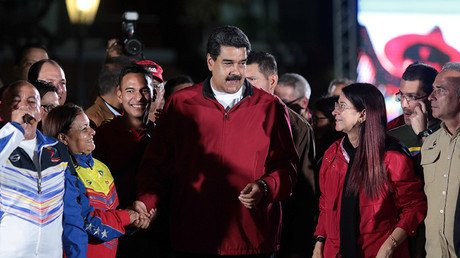Venezuela’s chief prosecutor ousted & blocked from office amid ongoing protests (PHOTOS, VIDEOS)
The crisis in Venezuela entered a new phase after the country’s newly elected Constituent Assembly, during its first day of work and amid the ongoing violent protests, dismissed from office, the main opposition figure and Chief Prosecutor Luisa Ortega.
READ MORE: Venezuela inaugurates Constituent Assembly amid street unrest
The 545-strong Constituent Assembly ruled to remove Ortega from office after the Supreme Court accused her of “alleged commission of serious misconduct.” No further details on charges against the country’s main opposition figure were given by the country’s highest court. Ortega was replaced with Tarek Saab, president Nicolas Maduro’s human rights ombudsman.
Carrying out the order, security forces surrounded Ortega’s office in Caracas preventing the 59-year-old official from entering. Pictures posted by the opposition figure on Twitter showed dozens of military clad men blockading the entrance of the Public Ministry of Venezuela.
“I denounce this arbitrary act before the national and international community,” Ortega tweeted from the scene.
Rechazo asedio al @MPvenezolano. Denuncio esta arbitrariedad ante la comunidad nacional e internacional #5Agpic.twitter.com/un7QWGBGJ7
— Luisa Ortega Díaz (@lortegadiaz) August 5, 2017
Ortega said she does not recognize the Constituent Assembly’s decision which she called “just a tiny example of what's coming for everyone that dares to oppose this totalitarian form of ruling.”
#AHORA Comunicado de la Fiscal General @lortegadiaz al pueblo de Venezuela y la comunidad internacional #5Agopic.twitter.com/fhNPdFAmNF
— Ministerio Público (@MPvenezolano) August 5, 2017
The new legislative body was elected last week and inaugurated Friday amid international criticism and mass public protests. The demonstrations have been ongoing since March and have claimed the lives of over 150 activists.
The opposition boycotted the election, calling the creation of the new body unconstitutional and designed to curb the power of the opposition-controlled parliament. The opposition also ran its own referendum, in which they claim 7 million people rejected the assembly.
After the elections Ortega filed a complaint, calling on a local court to halt the inauguration of the newly elected body while accusing the government of election fraud.
In what they call peaceful dissent, Ortega’s supporters continue to protest the unchecked powers of the newly elected body.
“The opposition has not renounced the demonstrations,” Carlos Camacho, a Venezuelan journalist told RT. “I see the situation either continuing in the cities or maybe getting worse. I don’t think this will die down anytime soon.”
“Now we have two parliaments. One parliament is dominated by the opposition and the other parliament is dominated by Nicolas Maduro,” Camacho explained. “Both sides are entrenched. One side, however, has the national guard fighting alongside it. The other side is just civilian.”
Maduro’s government has recognized and defended the results of the referendum, in which an estimated 8 million people voted, and blamed Washington for stoking the street protests and inciting violence.
Amid the ongoing crisis in the country, Donald Trump’s administration last month blacklisted a number of senior Venezuelan officials including Maduro himself, freezing their assets in the US and banning American citizens from doing business with them.
Venezuelan Education minister, Elias Jaua, who previously served as vice president and foreign minister, told RT that is was unacceptable that the United States imposes sanctions against a sovereign country after its citizens exercised their constitutional rights and voted in the referendum.
“What is an absolutely unacceptable fact is that we are being punished for following the norms of our constitution. In Venezuela a National Constituent Assembly can be called. This can be done by the president of the republic himself. The assembly members have been chosen by over 8 million people, more than 40 percent of all registered voters,” Jaua said in an interview with RT Spanish.
And in a new development Saturday, the foreign ministers of Argentina, Paraguay, Uruguay and Brazil announced that Venezuela has been suspended from the South American trading bloc, Mercosur. They further called on president Maduro to release prisoners and immediately begin the process of Venezuela's political transition.













